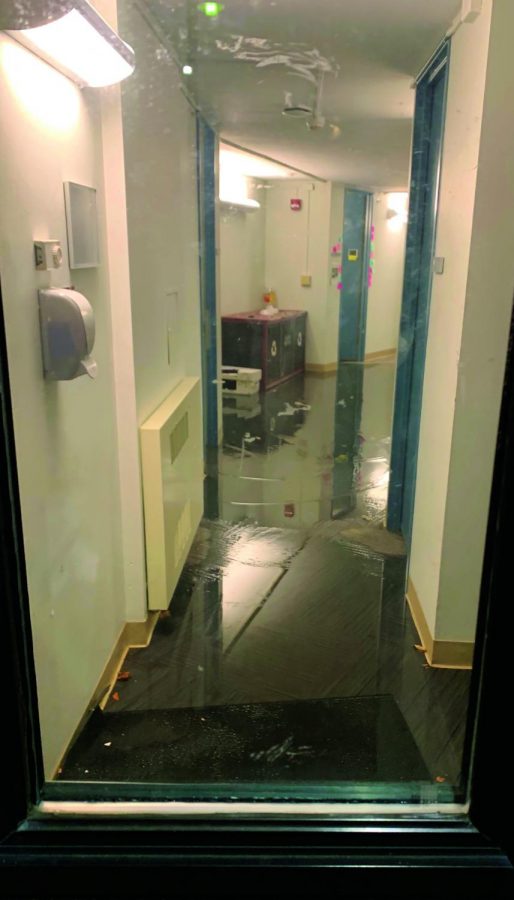Fire in Russell House Results in Flooding of First Floor
The Maroon-News is currently investigating this incident and has reached out to Director of Environmental Health and Safety Mary Williams, Campus Safety Officer Haley Benson, Hancock Commons Faculty Director Antonio Barrera and Community Leader on the impacted floor Johna Joseph for further information. Updates to the story will be posted on www.thecolgatemaroonnews.com.
The fire alarm in the bathroom of a first-floor dormitory unit in the Bryan Complex was activated early Saturday morning between 5:00 a.m. and 5:30 a.m., triggering the preventative sprinkler mechanisms to turn on in Russell House. Although there was no serious fire threat, the water that the sprinklers generated was unable to be deactivated in a timely manner by campus safety, resulting in approximately one to three inches of flooding in certain dorm units of Russell House.
The cause of the alarm was due to a small fire in a garbage can in a dormitory suite’s bathroom during the early hours of Saturday morning, which subsequently activated the preventative fire-safety measures that produced the flooding. The response to the incident included staff from Campus Safety, Environmental Health and Safety (EHS), Facilities Management and Residential Life. The Hamilton Fire Department and the Madison County Fire Coordinator also responded.
Associate Vice President for Campus Safety, Emergency Management and Environmental Health and Safety Dan Gough said he is unable to provide details about exactly where or how the fire occurred because the investigation remains open; however, he said he believes the fire was not caused Intentionally.
“It is clear from the initial investigation that the fire was not started deliberately and was not malicious in nature,” Gough said.
According to Gough, New York State requires that all fires on college and university campuses undergo investigation. He said that that investigations involving fire require techniques and methods similar to crime investigations.
“[Investigations include] witness interviews, timeline reconstruction, review of access controls and video surveillance, subject matter consultation… but usually include use of fire science and fire forensics to determine the source and spread of the fire,” Gough said.
Resident of the impacted floor sophomore Anna Unger said that students began worrying about the extent of the situation when they smelled smoke from outside the building after evacuating. The building’s fire alarm sounded for roughly an hour before students approached the building, where they were confronted at the door by Campus Safety Officer Haley Benson.
“We walked back to the entrance, and there was Officer Benson and she [said], something actually happened, we can’t let you back inside until we figure it out,’” Unger said. “You could see the floor was flooded.”
According to Unger, the sprinkler that went off in response to the fire expelled 200 gallons of water, flooding the entire floor. Unger said that once they were permitted to re-enter the building, residents of the floor were told to document any damage to their rooms and/or belongings.
“I was lucky the water only seeped into my side of the room, and everything under my bed is contained in a box so nothing was destroyed,” Unger said.
A residential suite in the basement of Russell House also had water permeate through its ceiling and walls due to the sprinklers. Residents of Russell House have had personal belongings and furniture compromised because of the sprinkler’s flooding.
According to sophomore Kyla Waring, a resident of the impacted floor, the affected residents are unsure if they will be reimbursed for damage to personal belongings. She said that the flooding caused her large inconveniences.
“It’s been pretty overwhelming trying to get everything back on track. We woke up at 5:30 a.m. to a fire alarm and smoke in the hallway and returned an hour later to find our shoes just floating around. A lot of my books were destroyed off the bat, including some expensive textbooks,” Waring said.
Waring said that the result of the flood incident required extensive cleanup efforts on her part.
“During the clean up process they took wet things from the floor and put them on my bed so I’ve also had to deal with that clean up. There isn’t really a precedent for situations like this so it’s not clear how the reimbursements will work but I’m hopeful it will all be righted. There was a good amount of damage to my things, I spent, like, seven hours cleaning and doing laundry,” Waring said.
Unger said that she feels the janitors, firefighters and Campus Safety officers involved in the immediate response measures handled the situation well.
“I definitely think they handled it correctly… They have a timeframe as to when they are allowed to tell us what exactly happened. People were talking to us every 30 minutes just checking in on us making sure were okay which like we all were. It definitely was handled really well; the guys that live in the suite were having to do individual interviews so I don’t actually know who caused it but I think they handled it professionally,” Unger said.
Nick Francoeur is a junior from Manhattan, New York studying philosophy at Colgate. He’s previously worked as a news writer and assistant news editor....







